Memoir of John Shakespear Bartley, 1916-1919 - Part 18
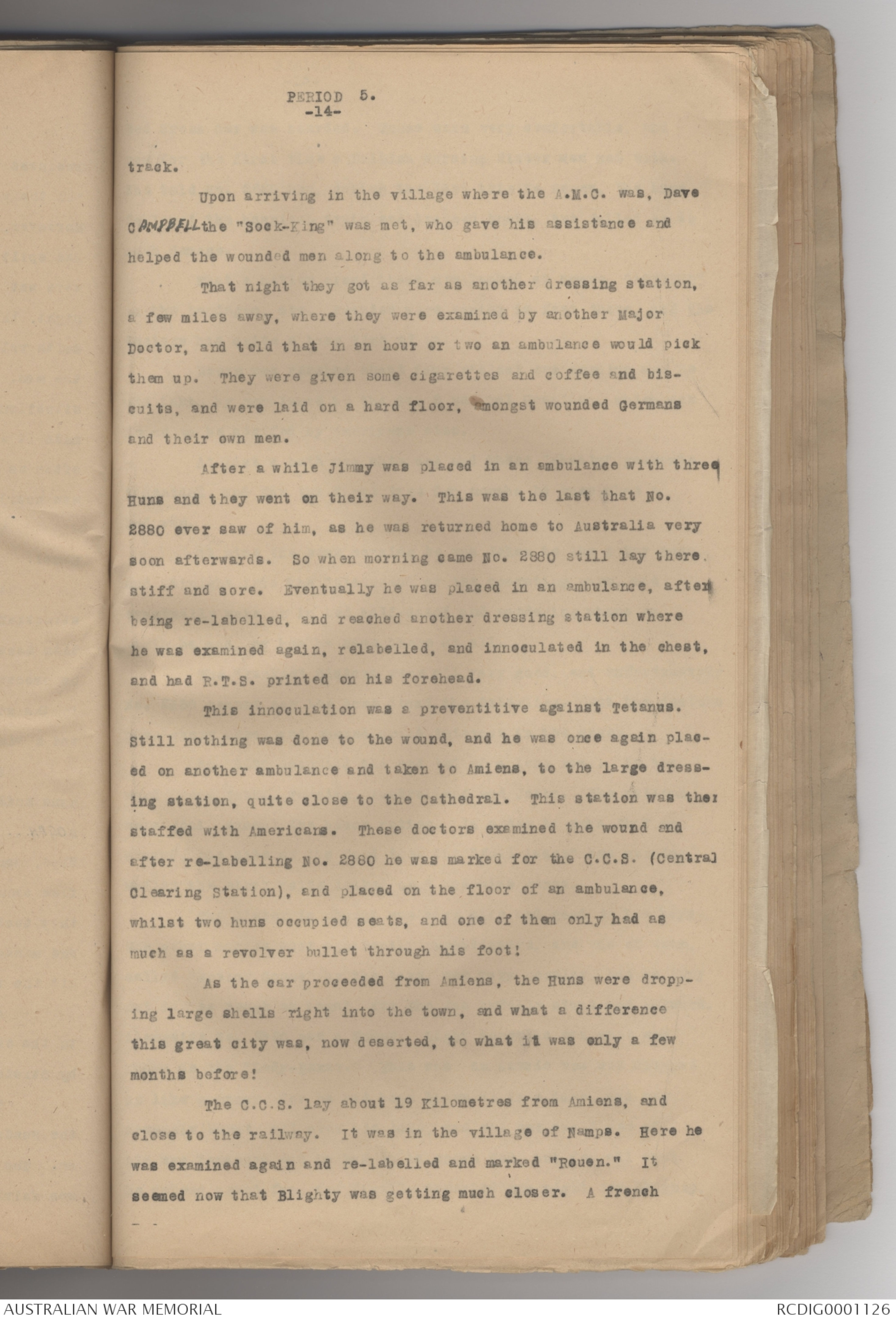
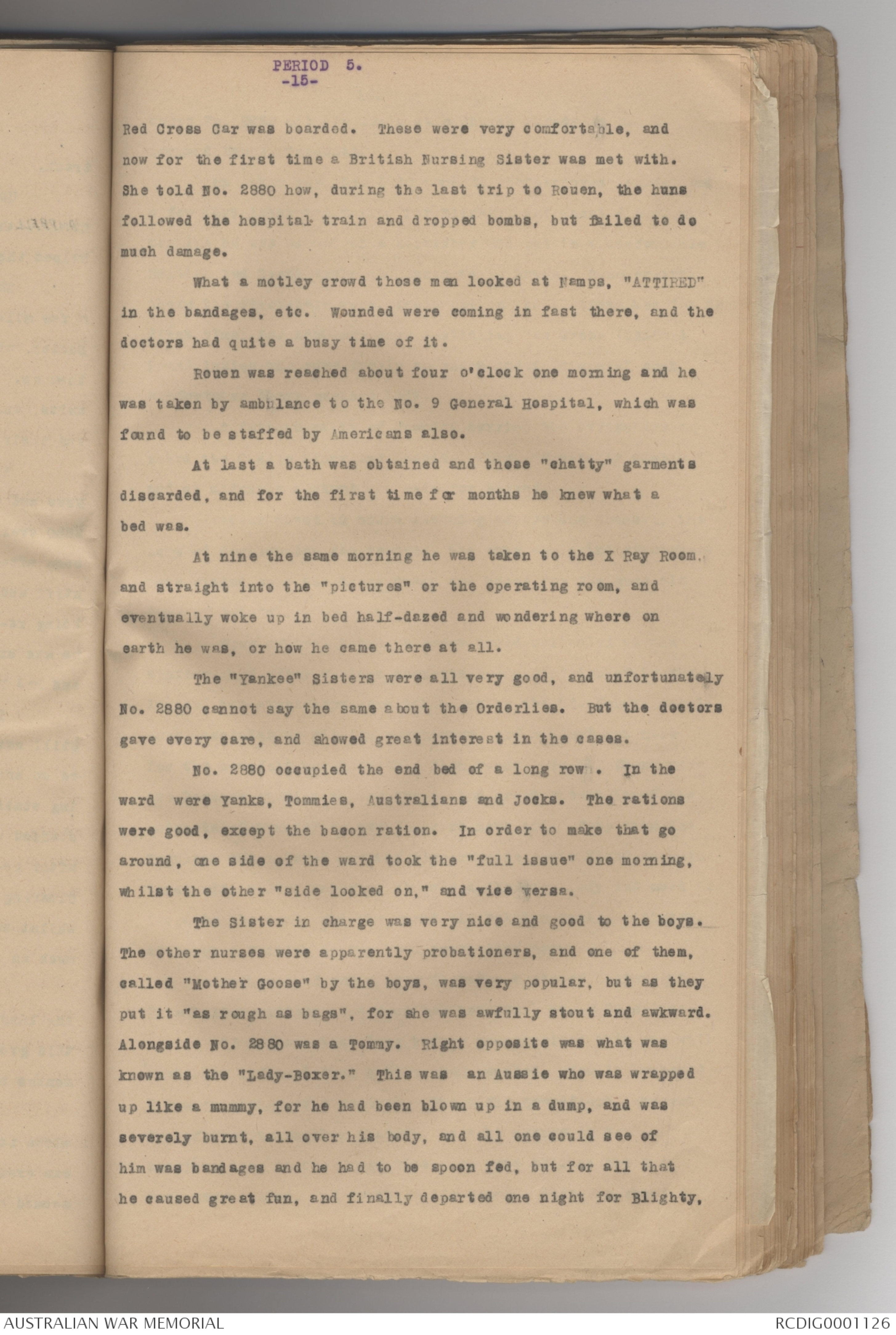
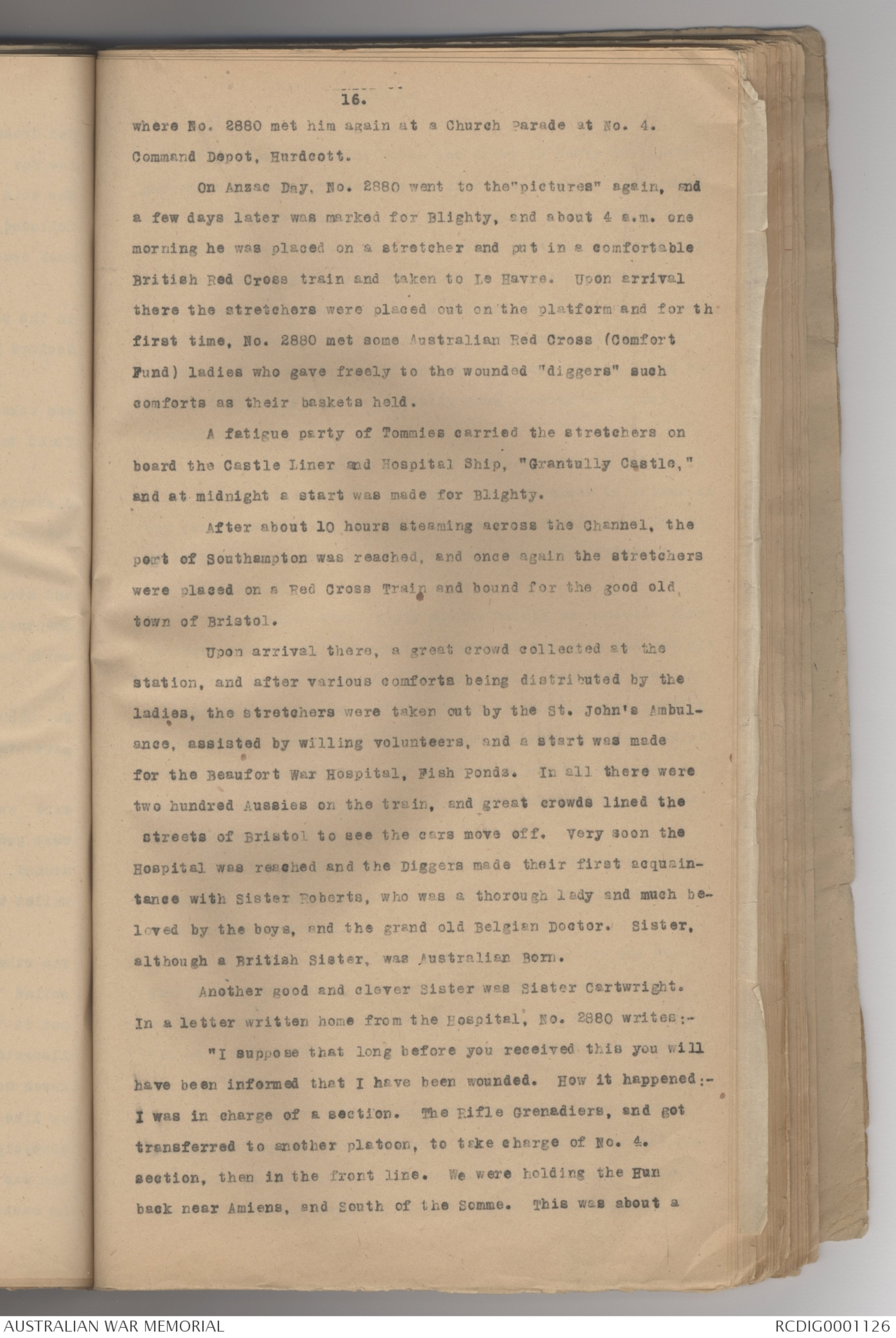
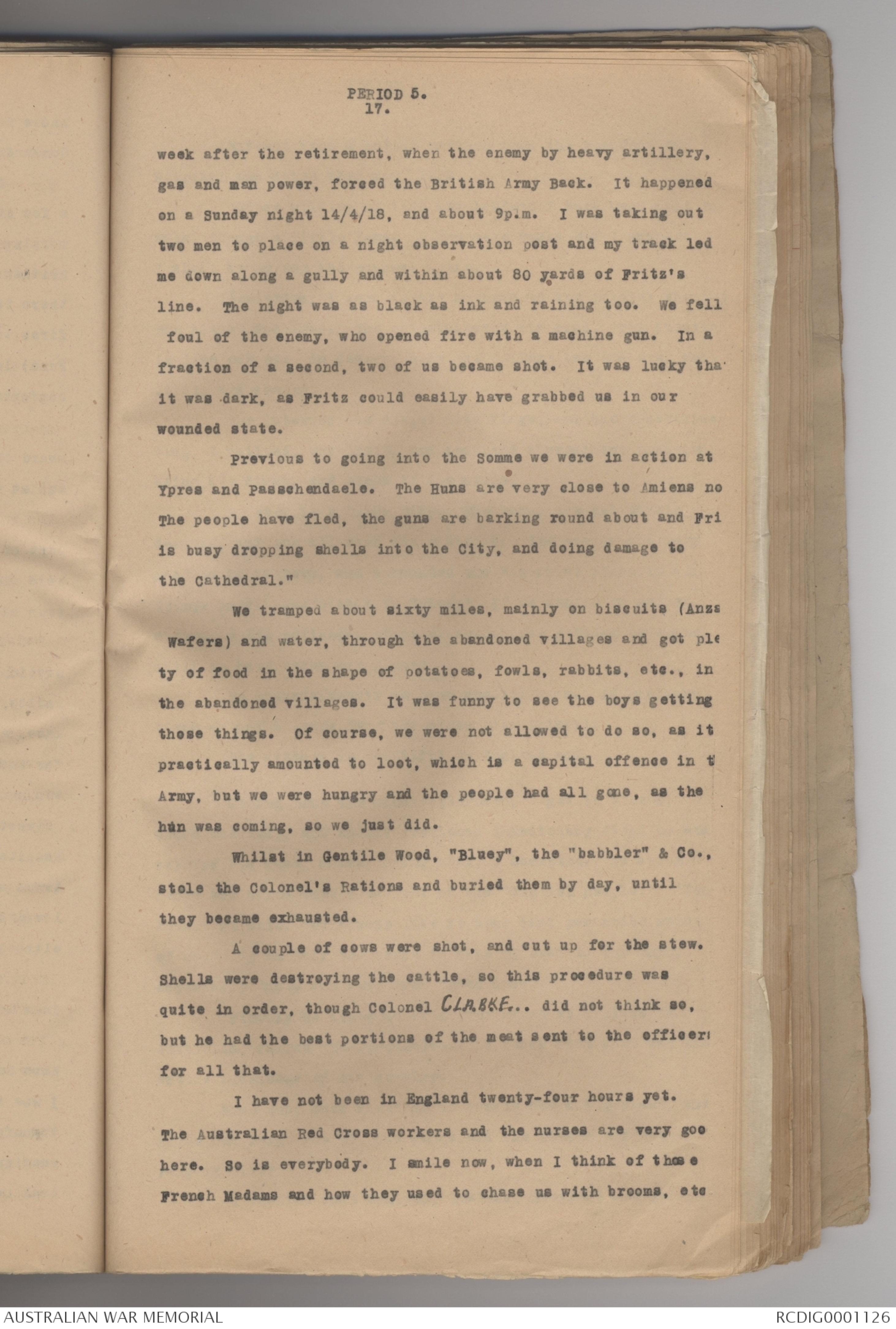
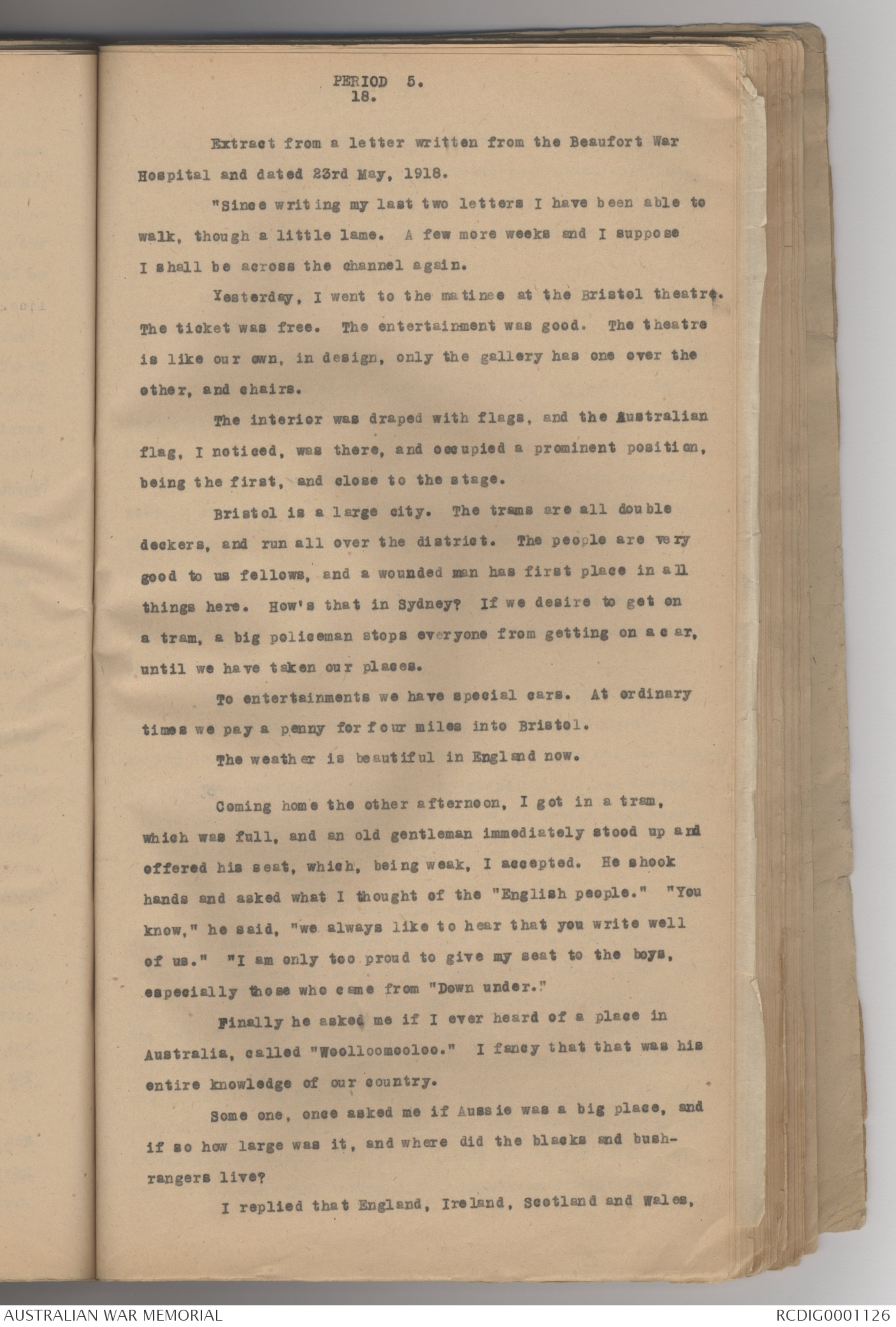
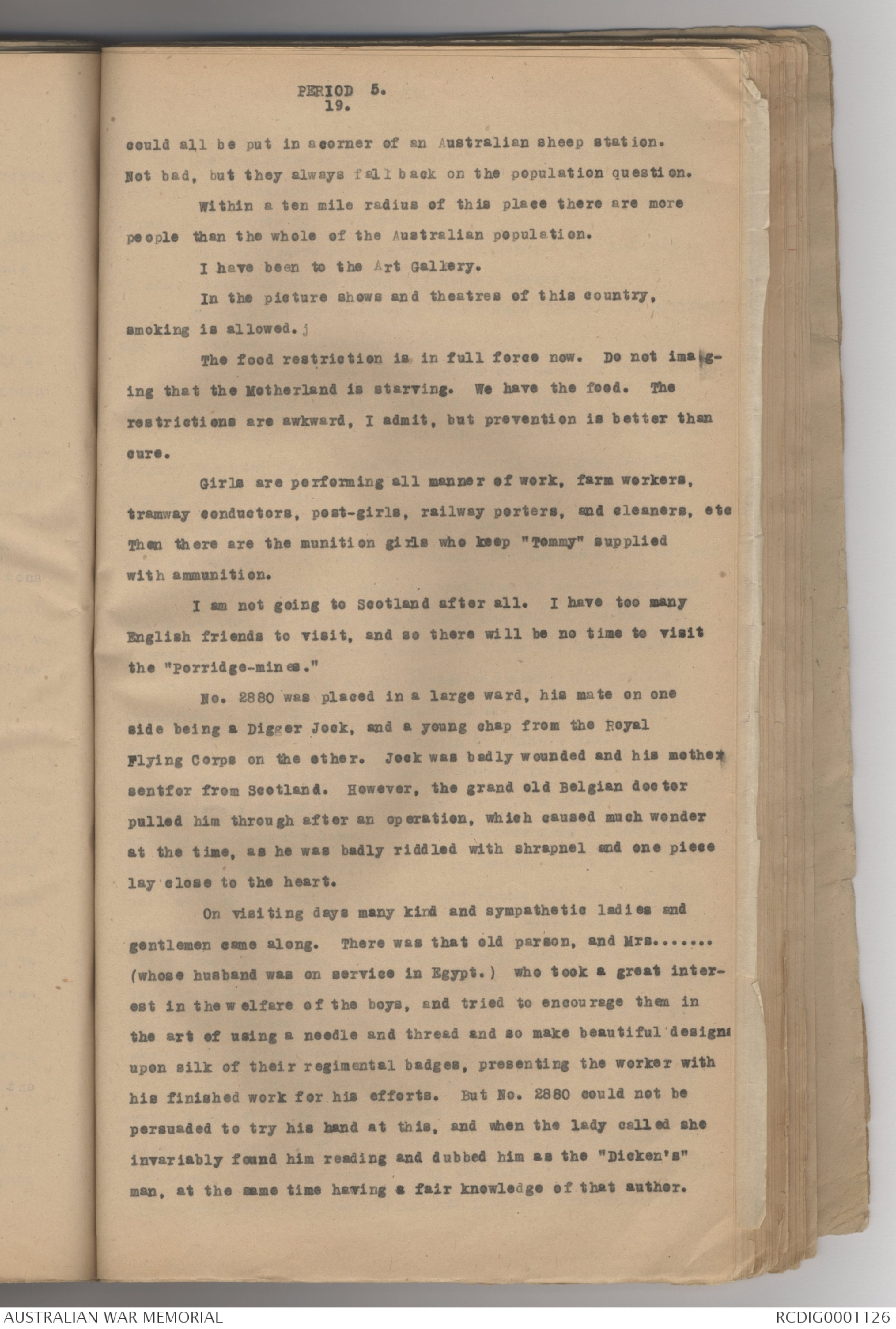
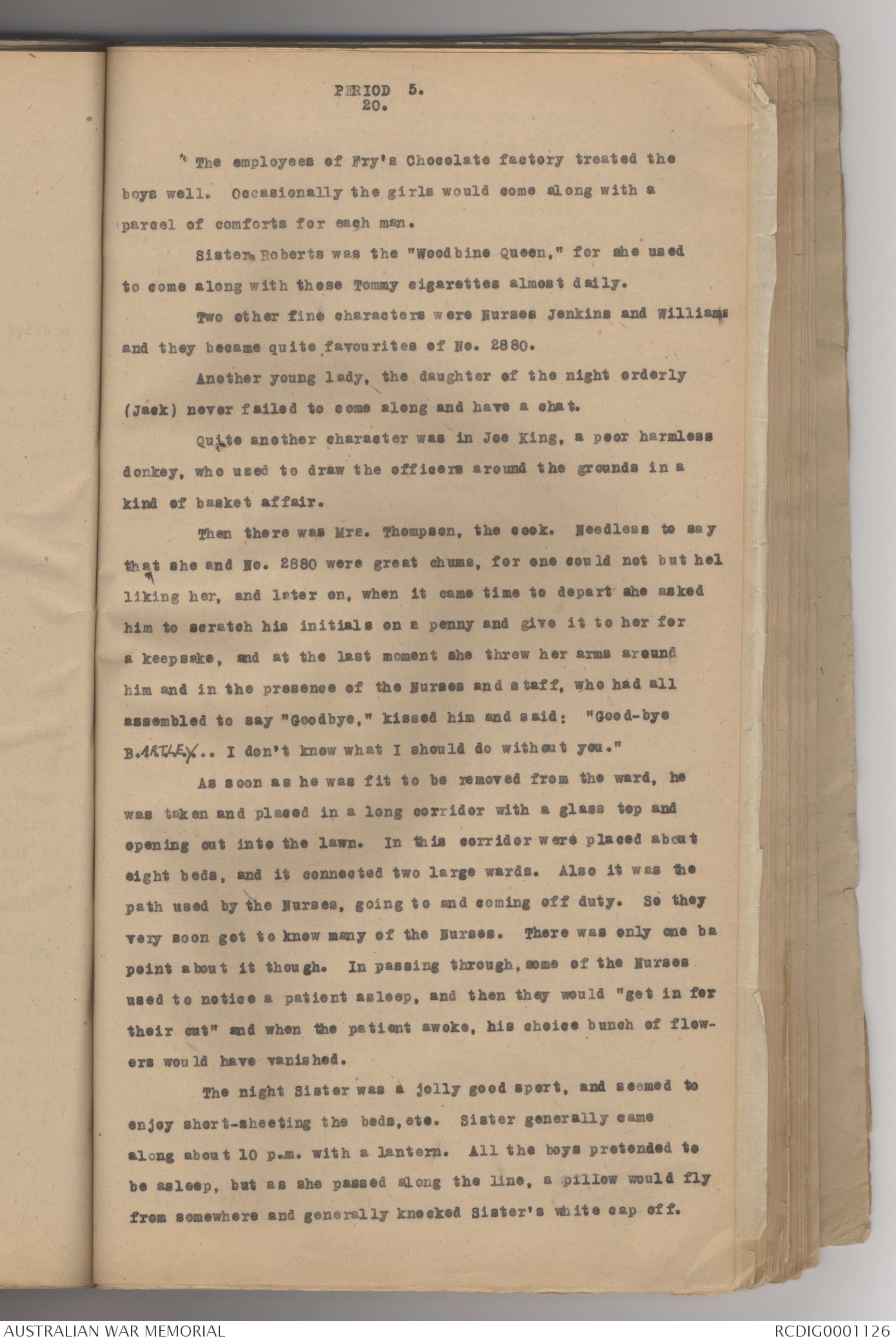
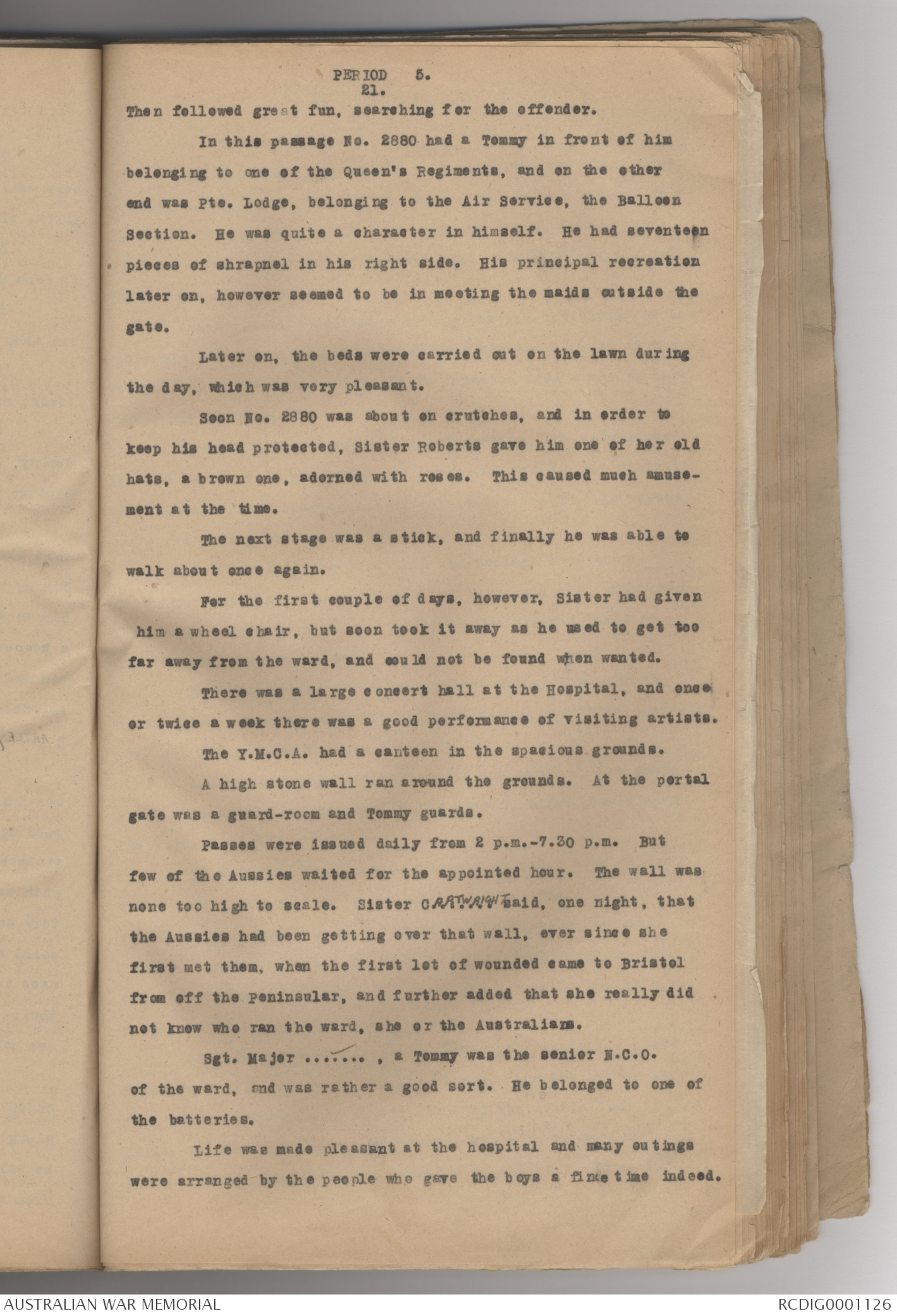
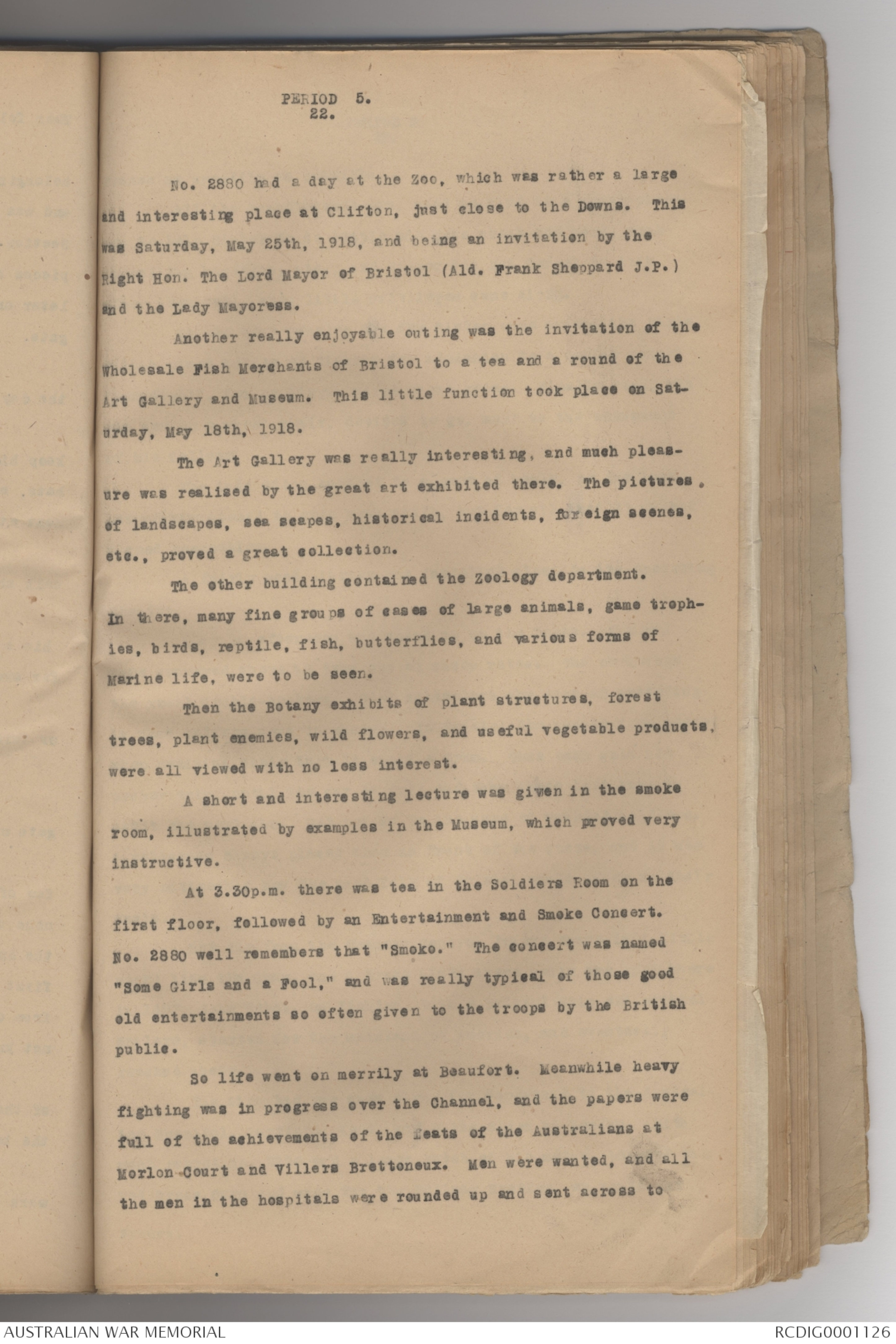
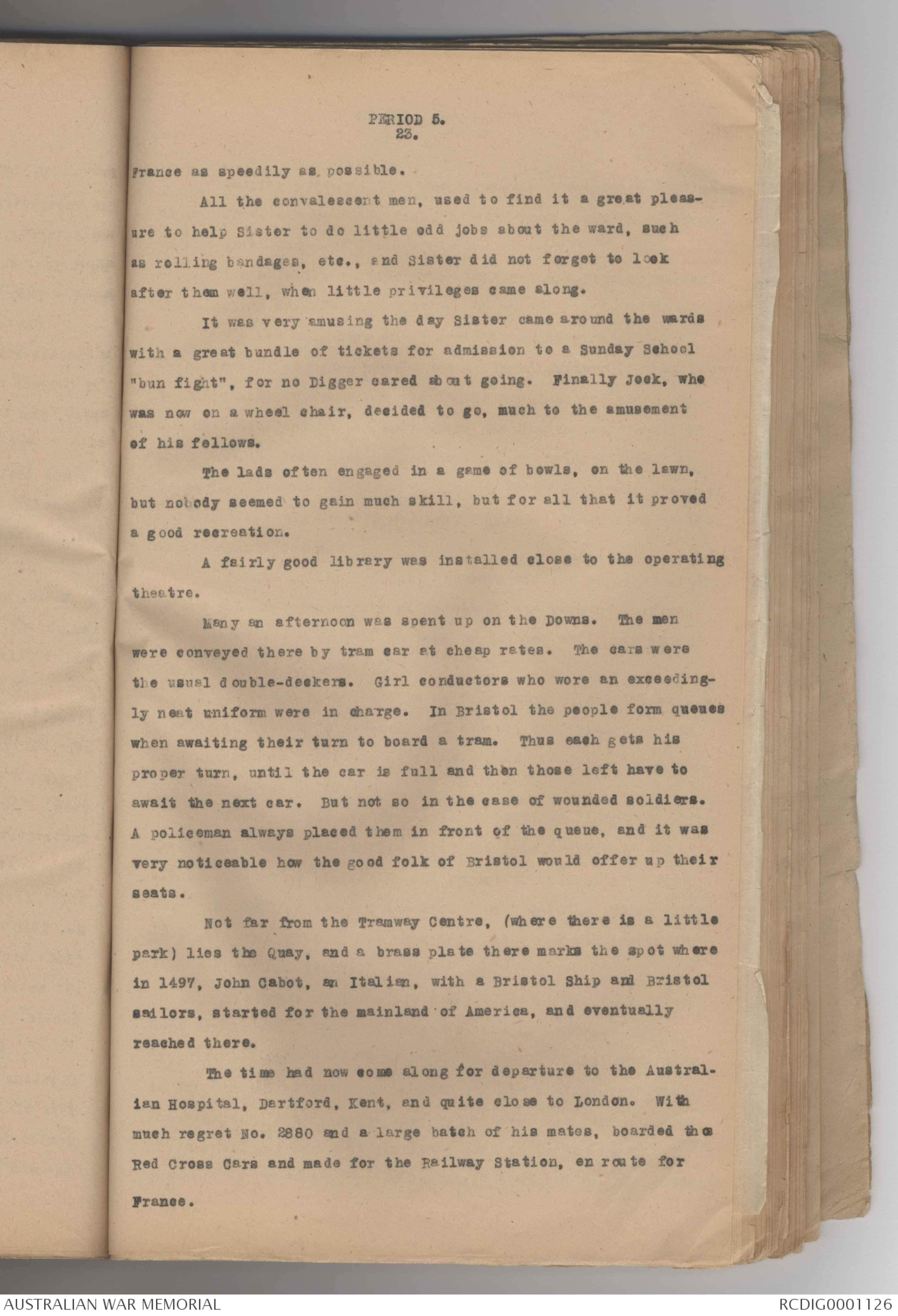
PERIOD 5.
-14-
track.
Upon arriving in the village where the A.M.C. was, Dave
CAMPBELL the "Sock-King" was met, who gave his assistance and
helped the wounded men along to the ambulance.
That night they got as far as another dressing station,
a few miles away, where they were examined by another Major
Doctor, and told that in an hour or two an ambulance would pick
them up. They were given some cigarettes and coffee and
biscuits, and were laid on a hard floor, amongst wounded Germans
and their own men.
After a while Jimmy was placed in an ambulance with three
Huns and they went on their way. This was the last that No.
2880 ever saw of him, as he was returned home to Australia very
soon afterwards. So when morning came No. 2880 still lay there.
stiff and sore. Eventually he was placed in an ambulance, after
being re-labelled, and reached another dressing station where
he was examined again, relabelled, and innoculated in the chest,
and had R.T.S. printed on his forehead.
This innoculation was a preventitive against Tetanus.
Still nothing was done to the wound, and he was once again placed
on another ambulance and taken to Amiens, to the large dressing
station, quite close to the Cathedral. This station was then
staffed with Americans. These doctors examined the wound and
after re-labelling No. 2880 he was marked for the C.C.S. (Central
Clearing Station), and placed on the floor of an ambulance,
whilst two huns occupied seats, and one of them only had as
much as a revolver bullet through his foot!
As the car proceeded from Amiens, the Huns were dropping
large shells right into the town, and what a difference
this great city was, now deserted, to what it was only a few
months before!
The C.C.S. lay about 19 Kilometres from Amiens, and
close to the railway. It was in the village of Namps. Here he
was examined again and re-labelled and marked "Rouen." It
seemed now that Blighty was getting much closer. A french
PERIOD 5.
-15-
Red Cross Car was boarded. These were very comfortable, and
now for the first time a British Nursing Sister was met with.
She told No. 2880 how, during the last trip to Rouen, the huns
followed the hospital train and dropped bombs, but failed to do
much damage.
What a motley crowd those men looked at Namps, "ATTIRED"
in the bandages, etc. Wounded were coming in fast there, and the
doctors had quite a busy time of it.
Rouen was reached about four o'clock one morning and he
was taken by ambulance to the No. 9 General Hospital, which was
found to be staffed by Americans also.
At last a bath was obtained and these "chatty" garments
discarded, and for the first time for months he knew what a
bed was.
At nine the same morning he was taken to the X Ray Room.
and straight into the "pictures" or the operating room, and
eventually woke up in bed half-dazed and wondering where on
earth he was, or how he came there at all.
The "Yankee" Sisters were all very good, and unfortunately
No. 2880 cannot say the same about the Orderlies. But the doctors
gave every care, and showed great interest in the cases.
No. 2880 occupied the end bed of a long row". In the
ward were Yanks, Tommies, Australians and Jocks. The rations
were good, except the bacon ration. In order to make that go
around, one side of the ward took the "full issue" one morning,
whilst the other "side looked on," and vice versa.
The Sister in charge was very nice and good to the boys.
The other nurses were apparently probationers, and one of them,
called "Mother Goose" by the boys, was very popular, but as they
put it "as rough as bags", for she was awfully stout and awkward.
Alongside No. 2880 was a Tommy. Right opposite was what was
known as the "Lady-Boxer." This was an Aussie who was wrapped
up like a mummy, for he had been blown up in a dump, and was
severely burnt, all over his body, and all one could see of
him was bandages and he had to be spoon fed, but for all that
he caused great fun, and finally departed one night for Blighty,
16.
where No. 2880 met him again at a Church Parade at No. 4.
Command Depot, Hurdcott.
On Anzac Day, No. 2880 went to the "pictures" again, and
a few days later was marked for Blighty, and about 4 a.m. one
morning he was placed on a stretcher and put in a comfortable
British Red Cross train and taken to Le Havre. Upon arrival
there the stretchers were placed out on the platform and for th
first time, No. 2880 met some Australian Red Cross (Comfort
Fund) ladies who gave freely to the wounded "diggers" such
comforts as their baskets held.
A fatigue party of Tommies carried the stretchers on
board the Castle Liner and Hospital Ship, "Grantully Castle,
and at midnight a start was made for Blighty.
After about 10 hours steaming across the Channel, the
port of Southampton was reached, and once again the stretchers
were placed on a Red Cross Train and bound for the good old,
town of Bristol.
Upon arrival there, a great crowd collected at the
station, and after various comforts being distributed by the
ladies, the stretchers were taken out by the St. John's Ambulance,
assisted by willing volunteers, and a start was made
for the Beaufort War Hospital, Fish Ponds. In all there were
two hundred Aussies on the train, and great crowds lined the
streets of Bristol to see the cars move off. Very soon the
Hospital was reached and the Diggers made their first acquaintance
with Sister Roberts, who was a thorough lady and much beloved
by the boys, and the grand old Belgian Doctor. Sister,
although a British Sister, was Australian Born.
Another good and clever Sister was Sister Cartwright.
In a letter written home from the Hospital, No. 2880 writes:-
"I suppose that long before you received this you will
have been informed that I have been wounded. How it happened:-
I was in charge of a section. The Rifle Grenadiers, and got
transferred to another platoon, to take charge of No. 4.
section, then in the front line. We were holding the Hun
back near Amiens, and South of the Somme. This was about a
PERIOD 5.
17.
week after the retirement, when the enemy by heavy artillery,
gas and man power, forced the British Army Back. It happened
on a Sunday night 14/4/18, and about 9pm. I was taking out
two men to place on a night observation post and my track led
me down along a gully and within about 80 yards of Fritz's
line. The night was as black as ink and raining too. We fell
foul of the enemy, who opened fire with a machine gun. In a
fraction of a second, two of us became shot. It was lucky tha
it was dark, as Fritz could easily have grabbed us in our
wounded state.
Previous to going into the Somme we were in action at
Ypres and Passchendaele. The Huns are very close to Amiens no
The people have fled, the guns are barking round about and Fri
is busy dropping shells into the City, and doing damage to
the Cathedral."
We tramped about sixty miles, mainly on biscuits (Anza
Wafers) and water, through the abandoned villages and got plenty
of food in the shape of potatoes, fowls, rabbits, etc., in
the abandoned villages. It was funny to see the boys getting
those things. Of course, we were not allowed to do so, as it
practically amounted to loot, which is a capital offence in t
Army, but we were hungry and the people had all gone, as the
hun was coming, so we just did.
Whilst in Gentile Wood, "Bluey", the "babbler" & Co.,
stole the Colonel's Rations and buried them by day, until
they became exhausted.
A couple of cows were shot, and cut up for the stew.
Shells were destroying the cattle, so this procedure was
quite in order, though Colonel CLARKE.. did not think so,
but he had the best portions of the meat sent to the officer
for all that.
I have not been in England twenty-four hours yet.
The Australian Red Cross workers and the nurses are very goo
here. So is everybody. I smile now, when I think of those
French Madams and how they used to chase us with brooms, etc
PERIOD 5.
18.
Extract from a letter written from the Beaufort War
Hospital and dated 23rd May, 1918.
"Since writing my last two letters I have been able to
walk, though a little lame. A few more weeks and I suppose
I shall be across the channel again.
Yesterday, I went to the matinee at the Bristol theatre.
The ticket was free. The entertainment was good. The theatre
is like our own, in design, only the gallery has one over the
ether, and chairs.
The interior was draped with flags, and the Australian
flag, I noticed, was there, and occupied a prominent position,
being the first, and close to the stage.
Bristol is a large city. The trams are all double
deckers, and run all over the district. The people are very
good to us fellows, and a wounded man has first place in all
things here. How's that in Sydney? If we desire to get on
a tram, a big policeman stops everyone from getting on a car,
until we have taken our places.
To entertainments we have special cars. At ordinary
times we pay a penny for four miles into Bristol.
The weather is beautiful in England now.
Coming home the other afternoon, I got in a tram,
which was full, and an old gentleman immediately stood up and
offered his seat, which, being weak, I accepted. He shook
hands and asked what I thought of the "English people." "You
know," he said, "we always like to hear that you write well
of us." "I am only too proud to give my seat to the boys,
especially those who come from "Down under."
Finally he asked me if I ever heard of a place in
Australia, called "Woolloomooloo." I fancy that that was his
entire knowledge of our country.
Some one, once asked me if Aussie was a big place, and
if so how large was it, and where did the blacks and
bushrangers live?
I replied that England, Ireland, Scotland and Wales,
PERIOD 5.
19.
could all be put in a corner of an Australian sheep station.
Not bad, but they always fall back on the population question.
Within a ten mile radius of this place there are more
people than the whole of the Australian population.
I have been to the Art Gallery.
In the picture shows and theatres of this country,
smoking is allowed.;
The food restriction is in full force now. Do not imaging
that the Motherland is starving. We have the food. The
restrictions are awkward, I admit, but prevention is better than
cure.
Girls are performing all manner of work, farm workers,
tramway conductors, post-girls, railway porters, and cleaners, etc
Then there are the munition girls who keep "Tommy" supplied
with ammunition.
I am not going to Scotland after all. I have too many
English friends to visit, and so there will be no time to visit
the "Porridge-mines."
Ne. 2880 was placed in a large ward, his mate on one
side being a Digger Jock, and a young chap from the Royal
Flying Corps on the ether. Jock was badly wounded and his mother
sentfor from Scotland. However, the grand old Belgian doctor
pulled him through after an operation, which caused much wonder
at the time, as he was badly riddled with shrapnel and one piece
lay close to the heart.
On visiting days many kind and sympathetic ladies and
gentlemen came along. There was that old parson, and Mrs.......
(whose husband was on service in Egypt.) who took a great interest
in the welfare of the boys, and tried to encourage them in
the art of using a needle and thread and so make beautiful designs
upon silk of their regimental badges, presenting the worker with
his finished work for his efforts. But No. 2880 could not be
persuaded to try his hand at this, and when the lady called she
invariably found him reading and dubbed him as the "Dicken's
man, at the same time having a fair knowledge of that author.
PERIOD 5.
20.
The employees of Fry's Chocolate factory treated the
boys well. Occasionally the girls would come along with a
parcel of comforts for each man.
Sister Roberts was the "Woodbine Queen," for she used
to come along with these Tommy cigarettes almost daily.
Two other fine characters were Nurses Jenkins and Williams
and they became quite favourites of No. 2880.
Another young lady, the daughter of the night orderly
(Jack) never failed to come along and have a chat.
Quite another character was in Joe King, a poor harmless
donkey, who used to draw the officers around the grounds in a
kind of basket affair.
Then there was Mrs. Thompson, the cook. Needless to say
that she and No. 2880 were great chums, for one could not but help
liking her, and later on, when it came time to depart she asked
him to scratch his initials on a penny and give it to her for
a keepsake, and at the last moment she threw her arms around
him and in the presence of the Nurses and staff, who had all
assembled to say "Goodbye," kissed him and said: "Good-bye
BARTLEY. I don't know what I should do without you."
As soon as he was fit to be removed from the ward, he
was taken and placed in a long corridor with a glass top and
opening out onto the lawn. In this corridor were placed about
eight beds, and it connected two large wards. Also it was the
path used by the Nurses, going to and coming off duty. So they
very soon get to know many of the Nurses. There was only one ba
point about it though. In passing through, some of the Nurses
used to notice a patient asleep, and then they would "get in for
their cut" and when the patient awoke, his choice bunch of
flowers would have vanished.
The night Sister was a jolly geed sport, and seemed to
enjoy short-sheeting the beds, etc. Sister generally came
along about 10 pm. with a lantern. All the boys pretended to
be asleep, but as she passed along the line, a pillow would fly
from somewhere and generally knocked Sister's white cap off.
PERIOD 5.
21.
Then followed great fun, searching for the offender.
In this passage No. 2880 had a Tommy in front of him
belonging to one of the Queen's Regiments, and on the other
end was Pte. Lodge, belonging to the Air Service, the Balloon
Section. He was quite a character in himself. He had seventeen
pieces of shrapnel in his right side. His principal recreation
later on, however seemed to be in meeting the maids outside the
gate.
Later on, the beds were carried out on the lawn during
the day, which was very pleasant.
Soon No. 2880 was about on crutches, and in order to
keep his head protected, Sister Roberts gave him one of her old
hats, a brown one, adorned with roses. This caused much amusement
at the time.
The next stage was a stick, and finally he was able to
walk about once again.
For the first couple of days, however, Sister had given
him a wheel chair, but soon took it away as he used to get too
far away from the ward, and could not be found when wanted.
There was a large concert hall at the Hospital, and once
or twice a week there was a good performance of visiting artists.
The Y.M.C.A. had a canteen in the spacious grounds.
A high stone wall ran around the grounds. At the portal
gate was a guard-room and Tommy guards.
Passes were issued daily from 2 p.m.-7.30 p.m. But
few of the Aussies waited for the appointed hour. The wall was
none too high to scale. Sister CARTWRIGHT said, one night, that
the Aussies had been getting over that wall, ever since she
first met them, when the first let of wounded came to Bristol
from off the Peninsular, and further added that she really did
net know who ran the ward, she or the Australians.
Sgt. Major ................., a Tommy was the senior N.C.0.
of the ward, and was rather a good sort. He belonged to one of
the batteries.
Life was made pleasant at the hospital and many outings
were arranged by the people who gave the boys a fine time indeed.
PERIOD 5.
22.
No. 2880 had a day at the Zoo, which was rather a large
and interesting place at Clifton, just close to the Downs. This
was Saturday, May 25th, 1918, and being an invitation by the
Right Hon. The Lord Mayor of Bristol (Ald. Frank Sheppard J.P.)
and the Lady Mayoress.
Another really enjoyable outing was the invitation of the
Wholesale Fish Merchants of Bristol to a tea and a round of the
Art Gallery and Museum. This little function took place on
Saturday May 18th, 1918.
The Art Gallery was really interesting, and much pleasure
was realised by the great art exhibited there. The pictures.
of landscapes, sea scapes, historical incidents, foreign scenes,
etc., proved a great collection.
The other building contained the Zoology department.
In there, many fine groups of cases of large animals, game trophies,
birds, reptile, fish, butterflies, and various forms of
Marine life, were to be seen.
Then the Botany exhibits of plant structures, forest
trees, plant enemies, wild flowers, and useful vegetable products,
were all viewed with no less interest.
A short and interesting lecture was given in the smoke
room, illustrated by examples in the Museum, which proved very
instructive.
At 3.30p.m. there was tea in the Soldiers Room on the
first floor, followed by an Entertainment and Smoke Concert.
No. 2880 well remembers that "Smoko." The concert was named
"Some Girls and a Fool," and was really typical of those good
old entertainments so often given to the troops by the British
public.
So life went on merrily at Beaufort. Meanwhile heavy
fighting was in progress over the Channel, and the papers were
full of the achievements of the feats of the Australians at
Morlon-Court and Villers Brettoneux. Men were wanted, and all
the men in the hospitals were rounded up and sent across to
PERIOD 5.
23.
France as speedily as possible.
All the convalescent men, used to find it a great pleasure
to help Sister to do little odd jobs about the ward, such
as rolling bandages, etc., and Sister did not forget to look
after them well, when little privileges came along.
It was very amusing the day Sister came around the wards
with a great bundle of tickets for admission to a Sunday School
"bun fight", for no Digger cared about going. Finally Jock, who
was now on a wheel chair, decided to go, much to the amusement
of his fellows.
The lads often engaged in a game of bowls, on the lawn,
but nobody seemed to gain much skill, but for all that it proved
a good recreation.
A fairly good library was installed close to the operating
theatre.
Many an afternoon was spent up on the Downs. The men
were conveyed there by tram car at cheap rates. The cars were
the usual double-deckers. Girl conductors who wore an exceedingly
neat uniform were in charge. In Bristol the people form queues
when awaiting their turn to board a tram. Thus each gets his
proper turn, until the car is full and then those left have to
await the next car. But not so in the case of wounded soldiers.
A policeman always placed them in front of the queue, and it was
very noticeable how the good folk of Bristol would offer up their
seats.
Not far from the Tramway Centre, (where there is a little
park) lies the Quay, and a brass plate there marks the spot where
in 1497, John Cabot, an Italian, with a Bristol ship and Bristol
sailors, started for the mainland of America, and eventually
reached there.
The time had now cone along for departure to the Australian
Hospital, Dartford, Kent, and quite close to London. With
much regret No. 2880 and a large batch of his mates, boarded the
Red Cross Cars and made for the Railway Station, en route for
France.
 JayB
JayBThis transcription item is now locked to you for editing. To release the lock either Save your changes or Cancel.
This lock will be automatically released after 60 minutes of inactivity.